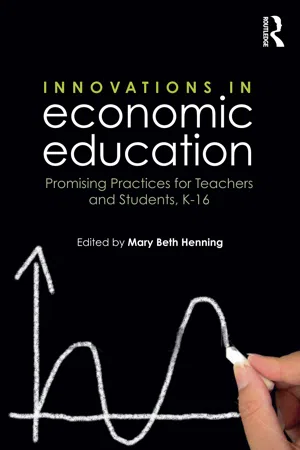Economics
Economic Way of Thinking
The "Economic Way of Thinking" refers to the analytical approach used in economics to understand human behavior and decision-making in the context of scarcity. It involves rational decision-making based on cost-benefit analysis, the allocation of limited resources to satisfy unlimited wants, and the study of incentives that influence individual and societal choices.
Written by Perlego with AI-assistance
Related key terms
2 Key excerpts on "Economic Way of Thinking"
- eBook - ePub
Innovations in Economic Education
Promising Practices for Teachers and Students, K–16
- Mary Beth Henning(Author)
- 2016(Publication Date)
- Routledge(Publisher)
For decades, leading economic educators have contended that economic education in the K–12 schools should focus on teaching students how to use the Economic Way of Thinking (see, for example, National Council for the Social Studies, 2013; Wentworth, 1987; Wentworth & Western, 1990). To do so, according to this view, teachers should introduce a small set of basic principles of economics and then engage students in extended practice using those principles to think in new ways about a wide range of incidents and issues in market activity and in the institutions surrounding that activity.Defining the Economic Way of ThinkingHow do you get started thinking from an economic perspective? Let’s begin by considering some key assumptions of that perspective, described by American economists Paul Heyne, Peter Boettke, and David Prychitko (2006) as “All social phenomena emerge from the actions and interactions of individuals who are choosing in response to expected costs and benefits to themselves” (p. 6). Let’s briefly examine these assumptions as they might be applied to understanding why people make the choices they do.• Actions are produced by the choices individuals make. We are all members of groups—families, friends, and organizations—but the Economic Way of Thinking focuses on individuals making choices. Individual choices, in turn, shape institutions and influence the activity of groups and nations.• Individuals make their choices by taking account of possible costs and benefits . People make decisions that they think will make them happier or more satisfied. The sources of happiness or satisfaction might be material gains (a new car, perhaps, or a better salary, or a new smartphone) or non-material rewards (perhaps the internal satisfaction gained by volunteering to work at a homeless shelter).• Finally, the use of the word “expected ,” in the phrase “expected costs and benefits,” is important. Since we never know how things will turn out, and we can never have perfect information when we make a choice, we make our choices as best we can and hope they are the right ones. Often we make good decisions; sometimes we make mistakes. People are imperfect decision-makers.Now, let’s go a little deeper. Here are six principles that illustrate the Economic Way of Thinking. Variations of these principles are widely used in curriculum publications such as those published by the Council on Economic Education and in some student textbooks (see, for example, Schug & Wood, 2011). - eBook - ePub
- Enrico Colombatto(Author)
- 2016(Publication Date)
- Routledge(Publisher)
1 The Economic Way of Thinking DOI: 10.4324/9781315658988-2 1.1 On the nature of economics and the importance of methodology Why should one be interested in economics and what kind of discipline is it? Simply put, economics is important because it offers a powerful set of conceptual tools that help us understand how individuals behave under scarcity, how they strive to improve their well-being without resorting to violence, and how they respond to the conditions and constraints that frame or otherwise affect their choices. In short, economics is about explaining people's behaviour and interactions when they cannot satisfy all their wishes and aspirations, i.e. when they must choose among different options and when they must explore the opportunities offered by cooperation and exchange. In this light, then, economics is clearly a social science, since individuals operate in a social context defined by other people's actions and by the rules that apply to their community. Moreover, since observing and making sense of what one sees do not involve any form of judgement, economics can be regarded as a value-free discipline with no normative connotations. In other words, the economist's effort to appreciate how people act does not mean that he knows how agents ought to act, or that he is authorised to take action or to command them to change whenever he sees people deviating from his expectations or wishes. Of course, one can evaluate the moral content of individual preferences, as well as of the outcomes that interactions produce. Likewise, and perhaps more importantly, the economist should be aware that moral standards, culture and tradition, historical accidents and prejudice do influence individuals’ preferences and, therefore, choices and human action
Learn about this page
Index pages curate the most relevant extracts from our library of academic textbooks. They’ve been created using an in-house natural language model (NLM), each adding context and meaning to key research topics.

